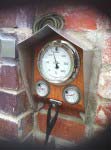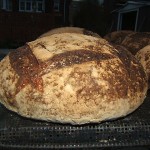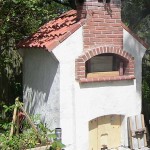Category: main menu • concrete menu • Cubic millimeters
concrete conversion
Amount: 1 cubic millimeter (mm3) of volume
Equals: 0.0000024 kilograms (kg - kilo) in mass
Converting cubic millimeter to kilograms value in the concrete units scale.
TOGGLE : from kilograms into cubic millimeters in the other way around.
CONVERT : between other concrete measuring units - complete list.
Conversion calculator for webmasters.
Concrete
This general purpose concrete formulation, called also concrete-aggregate (4:1 - sand/gravel aggregate : cement - mixing ratio w/ water) conversion tool is based on the concrete mass density of 2400 kg/m3 - 150 lbs/ft3 after curing (rounded). Unit mass per cubic centimeter, concrete has density 2.41g/cm3. The main concrete calculator page.
The 4:1 strength concrete mixing formula applies the measuring portions in volume sense (e.g. 4 buckets of concrete aggregate, which consists of gravel and sand, with 1 bucket of cement.) In order not to end up with a too wet concrete, add water gradually as the mixing progresses. If mixing concrete manually by hand; mix dry matter portions first and only then add water. This concrete type is commonly reinforced with metal rebars or mesh.
Convert concrete measuring units between cubic millimeter (mm3) and kilograms (kg - kilo) but in the other reverse direction from kilograms into cubic millimeters.
| conversion result for concrete: | |||||
| From | Symbol | Result | To | Symbol | |
| 1 cubic millimeter | mm3 | = 0.0000024 | kilograms | kg - kilo | |
Converter type: concrete measurements
This online concrete from mm3 into kg - kilo converter is a handy tool not just for certified or experienced professionals.
First unit: cubic millimeter (mm3) is used for measuring volume.
Second: kilogram (kg - kilo) is unit of mass.
concrete per 0.0000024 kg - kilo is equivalent to 1 what?
The kilograms amount 0.0000024 kg - kilo converts into 1 mm3, one cubic millimeter. It is the EQUAL concrete volume value of 1 cubic millimeter but in the kilograms mass unit alternative.
How to convert 2 cubic millimeters (mm3) of concrete into kilograms (kg - kilo)? Is there a calculation formula?
First divide the two units variables. Then multiply the result by 2 - for example:
2.4065302626279E-6 * 2 (or divide it by / 0.5)
QUESTION:
1 mm3 of concrete = ? kg - kilo
ANSWER:
1 mm3 = 0.0000024 kg - kilo of concrete
Other applications for concrete units calculator ...
With the above mentioned two-units calculating service it provides, this concrete converter proved to be useful also as an online tool for:
1. practicing cubic millimeters and kilograms of concrete ( mm3 vs. kg - kilo ) measuring values exchange.
2. concrete amounts conversion factors - between numerous unit pairs.
3. working with - how heavy is concrete - values and properties.
International unit symbols for these two concrete measurements are:
Abbreviation or prefix ( abbr. short brevis ), unit symbol, for cubic millimeter is:
mm3
Abbreviation or prefix ( abbr. ) brevis - short unit symbol for kilogram is:
kg - kilo
One cubic millimeter of concrete converted to kilogram equals to 0.0000024 kg - kilo
How many kilograms of concrete are in 1 cubic millimeter? The answer is: The change of 1 mm3 ( cubic millimeter ) unit of concrete measure equals = to 0.0000024 kg - kilo ( kilogram ) as the equivalent measure for the same concrete type.
In principle with any measuring task, switched on professional people always ensure, and their success depends on, they get the most precise conversion results everywhere and every-time. Not only whenever possible, it's always so. Often having only a good idea ( or more ideas ) might not be perfect nor good enough solution. If there is an exact known measure in mm3 - cubic millimeters for concrete amount, the rule is that the cubic millimeter number gets converted into kg - kilo - kilograms or any other concrete unit absolutely exactly.
Oven info & galleries
- Home Page
- Oven building CDrom details
- Pizza ovens
- New gallery
- Oven meals
- Vintage forum
- Rectangle shape vs. round igloo
- Building details
- Refractory concrete
- Heat resistant mortar
- Concrete cladding layer
- Thermal insulation
- Fire-bricks
- Fire-clay
- Saving money & time
- Good thermometer
- Oven building 1
- Building oven 2


